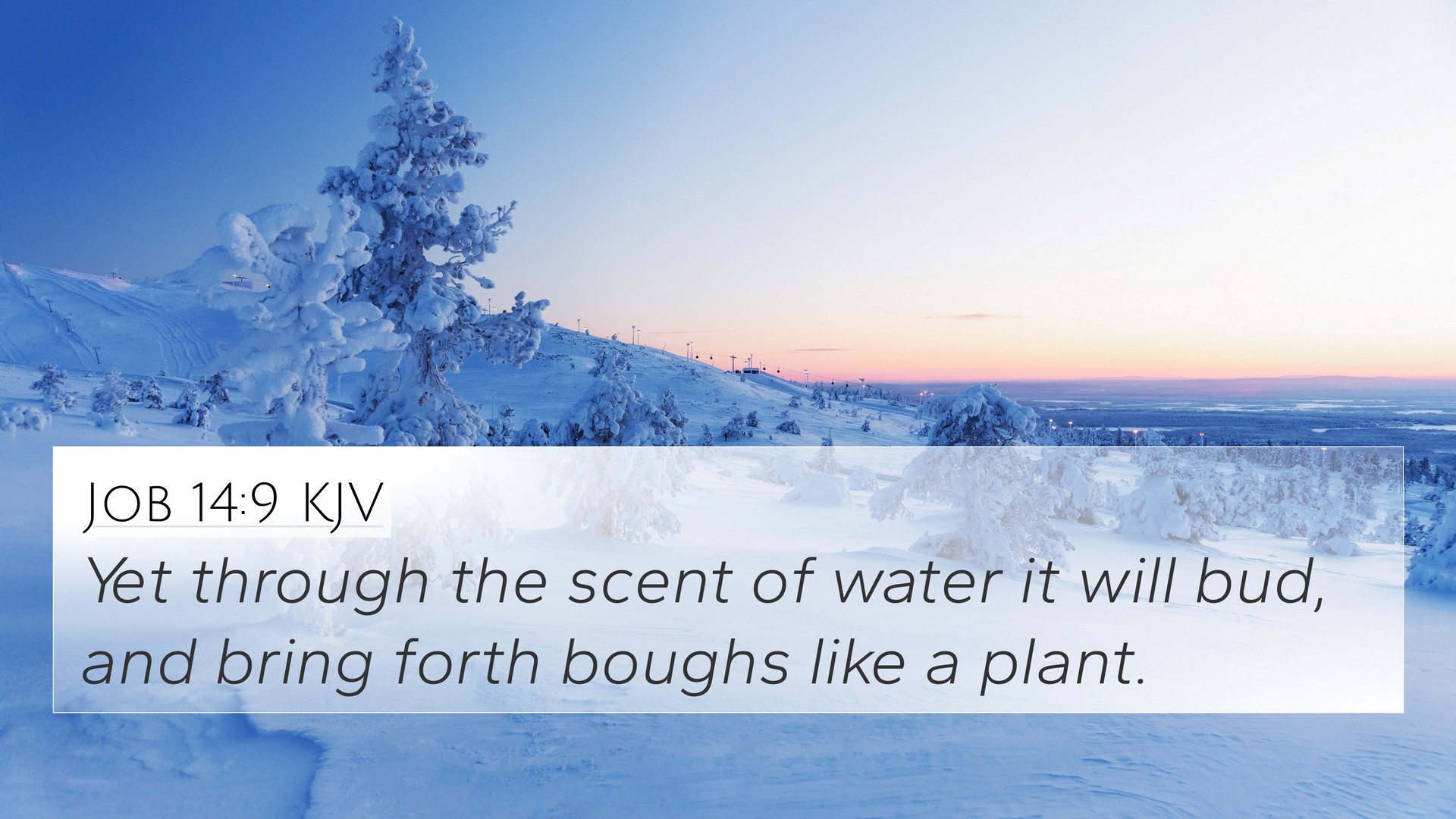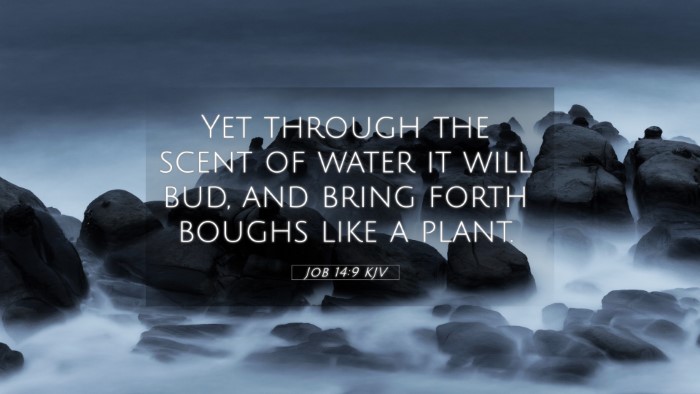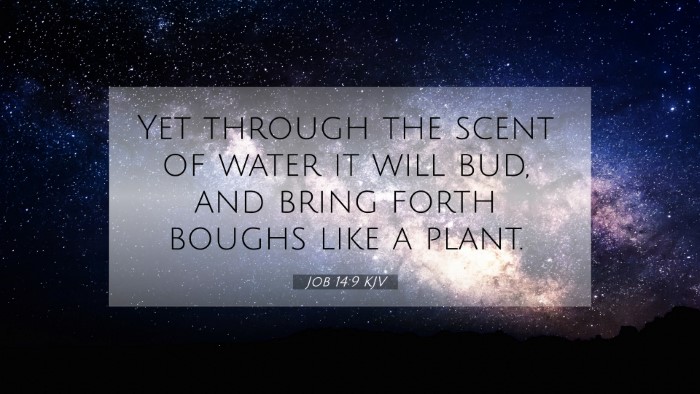Old Testament
Genesis Exodus Leviticus Numbers Deuteronomy Joshua Judges Ruth 1 Samuel 2 Samuel 1 Kings 2 Kings 1 Chronicles 2 Chronicles Ezra Nehemiah Esther Job Psalms Proverbs Ecclesiastes Song of Solomon Isaiah Jeremiah Lamentations Ezekiel Daniel Hosea Joel Amos Obadiah Jonah Micah Nahum Habakkuk Zephaniah Haggai Zechariah MalachiJob 14:9 Similar Verses
Job 14:9 Cross References
Yet through the scent of water it will bud, and bring forth boughs like a plant.
Uncover the Rich Themes and Topics of This Bible Verse
Listed below are the Bible themes associated with Job 14:9. We invite you to explore each theme to gain deeper insights into the Scriptures.
Job 14:9 Cross Reference Verses
This section features a detailed cross-reference designed to enrich your understanding of the Scriptures. Below, you will find carefully selected verses that echo the themes and teachings related to Job 14:9 KJV. Click on any image to explore detailed analyses of related Bible verses and uncover deeper theological insights.
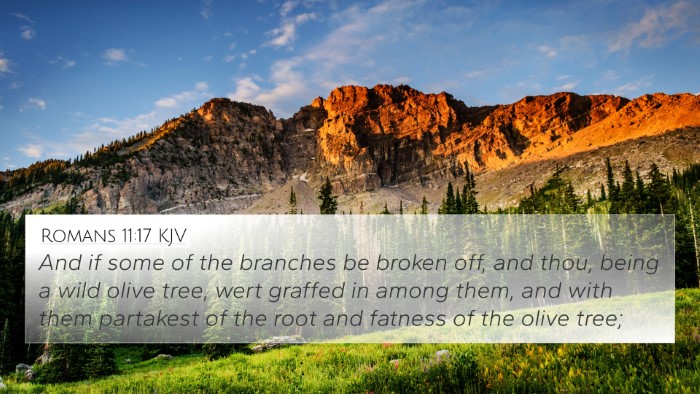
Romans 11:17 (KJV) »
And if some of the branches be broken off, and thou, being a wild olive tree, wert graffed in among them, and with them partakest of the root and fatness of the olive tree;

Ezekiel 17:3 (KJV) »
And say, Thus saith the Lord GOD; A great eagle with great wings, longwinged, full of feathers, which had divers colours, came unto Lebanon, and took the highest branch of the cedar:
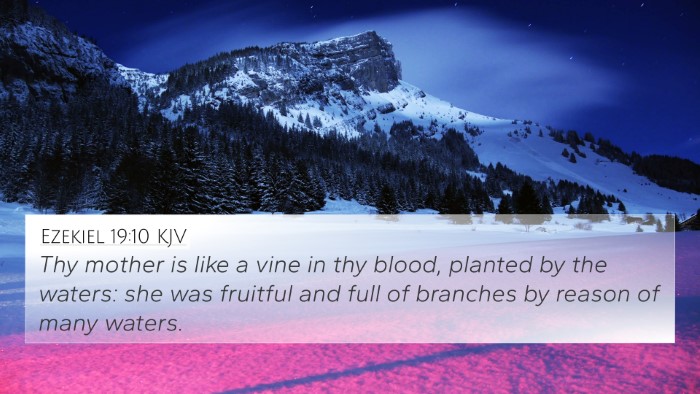
Ezekiel 19:10 (KJV) »
Thy mother is like a vine in thy blood, planted by the waters: she was fruitful and full of branches by reason of many waters.

Ezekiel 17:22 (KJV) »
Thus saith the Lord GOD; I will also take of the highest branch of the high cedar, and will set it; I will crop off from the top of his young twigs a tender one, and will plant it upon an high mountain and eminent:
Job 14:9 Verse Analysis and Similar Verses
Understanding Job 14:9
Job 14:9 states, "Yet if he dies, he shall revive; all the days of my appointed time will I wait, till my change come." This verse speaks profoundly to the themes of hope, resurrection, and the human condition in facing mortality.
Contextual Analysis
This verse is situated within Job's dialogue regarding the brevity of life and the deep desire for understanding the purpose of suffering. In this context, Job expresses a longing for revival after death, which reveals his faith in God's ability to bring about change and renewal.
Commentary Insights
-
Matthew Henry:
Henry emphasizes the hope of resurrection inherent in Job's words, hinting at a future where, despite death, life will continue through divine intervention. He sees this as a foreshadowing of the New Testament promise of eternal life.
-
Albert Barnes:
Barnes highlights Job's understanding of life’s transitory nature and how even in despair, hope can take root. He remarks on the assurance Job feels in God's power to revive, which underlines the need for patience during trials.
-
Adam Clarke:
Clarke provides an interpretation that underscores Job's awareness of divine timing. He notes that Job’s wait is not one of despair but one of expectation for God's appointed moment of change, showcasing Job's unwavering faith.
Thematic Connections
Job 14:9 aligns thematically with various biblical concepts that emphasize renewal, resurrection, and hope amid suffering:
- Resurrection: Job's anticipation of revival resonates with New Testament teachings, particularly John 11:25, where Jesus declares that He is the resurrection and the life.
- Hope in Suffering: The idea of waiting for divine change connects with Romans 8:18, where Paul speaks of present sufferings not being worthy to compare with future glory.
- Divine Timing: Ecclesiastes 3:1-2 discusses a time for every purpose under heaven, linking to Job's belief in God's appointed time for change.
- Transformation: 2 Corinthians 5:17 speaks of being a new creation in Christ, similar to the transformational hope Job expresses.
- Patience in Trials: James 1:2-4 encourages believers to consider it joy when facing trials, parallel to Job's steadfastness in waiting for resolution.
- Faith in God's Promise: Hebrews 11:1 defines faith as the substance of things hoped for, echoing Job's trust in God’s promise of renewal.
- The Nature of Mortality: Psalm 90:10 reflects on human life’s fleeting nature, akin to Job’s reflections on mortality and renewal.
Cross-References
The following Bible verses connect and provide a robust understanding of Job 14:9:
- John 11:25: "Jesus said to her, 'I am the resurrection and the life...'
- Romans 8:18: "For I consider that the sufferings of this present time are not worth comparing with the glory that is to be revealed to us."
- Ecclesiastes 3:1-2: "For everything there is a season, and a time for every matter under heaven."
- 2 Corinthians 5:17: "Therefore, if anyone is in Christ, he is a new creation. The old has passed away; behold, the new has come."
- James 1:2-4: "Count it all joy, my brothers, when you meet trials of various kinds..."
- Hebrews 11:1: "Now faith is the assurance of things hoped for, the conviction of things not seen."
- Psalm 90:10: "The years of our life are seventy, or even by reason of strength eighty..."
Conclusion
The exploration of Job 14:9 through these commentaries and scriptural connections reveals a powerful message of hope amidst human suffering. By engaging in cross-referencing Biblical texts and understanding thematic Bible verse connections, readers are invited to delve deeper into the faith and resilience demonstrated in Job's life, which resonates through the entirety of Scripture.
Tools for Further Study
For those interested in exploring more, consider utilizing tools like a Bible concordance or a Bible cross-reference guide to identify additional Bible verses that relate to each other and expand your study of scriptural cross-referencing methods.
